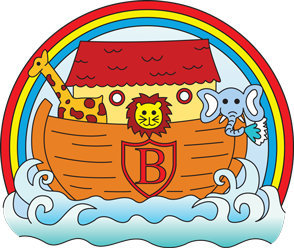Homework
Fire , Fire !!!
holly@balliolschool.co.uk
Here are some websites that you may want to visit to help with your home learning.
Game - The Great Fire of London
The Great Fire of London Facts - National Geographic Kids
The Great Fire of London | KS1 Topics | Ages 5-7 - BBC Bitesize
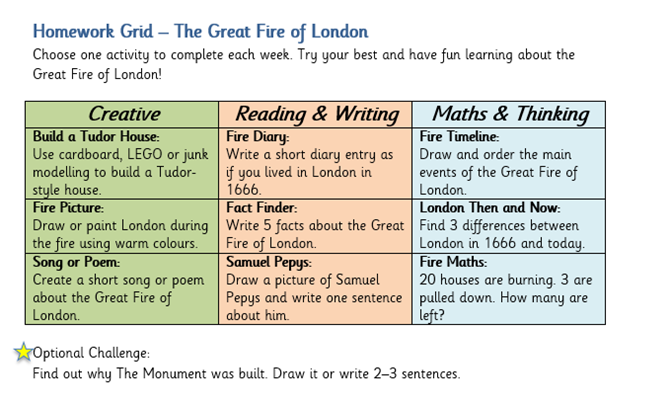
Homework
- Reading
- Children will have a reading diary and a book which they can take between home and school. Please make sure if you read at home you make a note of this in your reading diary. If you need an AR quiz on your book let an adult know in school and we can sort this out for you!
- Maths
- Children are working towards their Bronze times tables award (2s, 5s and 10s) and some are working on Silver, and can use TTRockstars to help them. A letter with their logins will be sent home on the first day.
- Spellings
- Children should practise their Year 1 and Year 2 common exception words regularly. These are shown below and were included in the letter sent home on the first day.
Year 2
Reading Homework Guidance
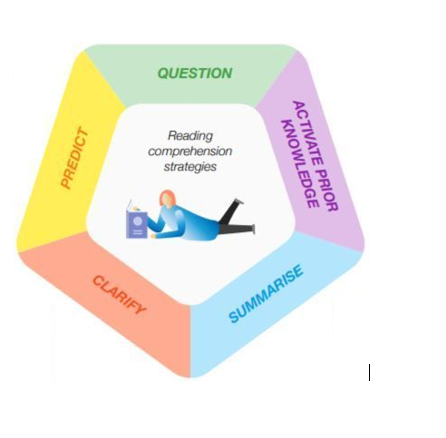
This term, we are focusing on building reading skills. Please try to read with your child daily if possible – even 10 minutes can make a big difference!
When reading together, encourage your child to:
-
Enjoy the story
-
Think about the words they see
-
Talk about what’s happening
Questions to Ask While Reading
Vocabulary (Word Understanding)
-
What does this word mean?
-
Can you think of another word that means the same?
-
Can you use it in your own sentence?
Understanding the Story
-
Who are the characters?
-
Where does the story happen?
-
What happened at the beginning, middle, end?
Thinking Deeper
-
How is the character feeling? How do you know?
-
Why do you think they did that?
-
What do you think will happen next?
Top Tips
-
Model good reading – read aloud with expression.
-
Talk about the book – discuss pictures, ideas, and feelings.
-
Link to real life – connect story events or words to your child’s experiences.
-
Re-read favourites – builds confidence and fluency.
Year 2
Maths Homework Guidance
Money Homework Ideas
-
Coin Hunt at Home
Ask your child to find coins at home.-
Can they name the coins?
-
Can they make different amounts (e.g. 10p, 20p, 50p)?
-
-
Mini Shop Game
Set up a pretend shop at home.-
Price toys or snacks (e.g. 5p, 10p, 20p).
-
Take turns being the shopkeeper and customer.
-
-
How Much Is It?
Draw or write 3 items with prices.-
Add the coins to find the total.
-
Challenge: Can you find a different way to pay?
-
-
Money Match
Match amounts to coins (e.g. 10p = two 5p coins).
Key skills:
-
Number bonds to 10 and 20 (pairs of numbers that add up to 10 or 20).
-
Partitioning numbers (breaking numbers into parts in different ways).
-
Counting in 2s, 5s and 10s.
Practising these skills regularly will help your child become more confident and fluent with numbers.
Ideas for Practising at Home
Number Bonds to 10, 20 and 50
-
Quick-fire questions: “What goes with 7 to make 10?”
-
Playing cards/dominoes: Match numbers that add up to 10 , 20 or 50.
-
Missing number games: “10 – ? = 6” or “? + 9 = 20.”
Partitioning Numbers
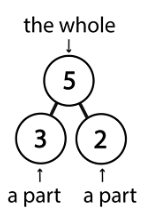
3+2=5 5=3+2 5-3=2 5-2=3
-
Show how numbers can be split in different ways:
-
10 = 6 + 4, or 10 = 7 + 3, or 10 = 8 + 2.
-
15 = 10 + 5, or 15 = 7 + 8.
-
-
Adding and subtracting using number line
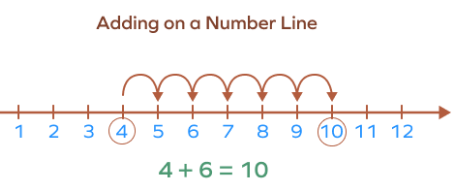
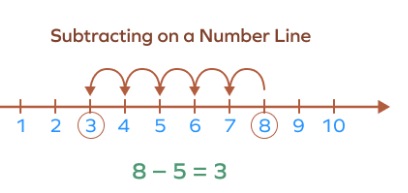
-
Use everyday objects (coins, toys, snacks) to break numbers into groups.
-
Write numbers in tens and ones: e.g. 23 = 20 + 3.
Top Tips
-
Keep it short and regular – 5 minutes a day is better than a long session once a week.
-
Link to real life – use shopping, cooking, or sharing to explore number bonds and partitioning.
Here are lots useful websites which you can use at home to help you with your Maths:
Times Table Rockstars - https://play.ttrockstars.com/auth/school/student/17733
NumBots -NumBots | Motivational maths practice for schools and families.
Times Tables - This website is particularly good if you need to work on a certain times table. It gives you different ways to practise the multiplication facts in order and mixed up. https://www.timestables.co.uk/
Hit The Button - This is a great game to help you practise your times tables, as well as related facts such as doubles, halves and square numbers. https://www.topmarks.co.uk/maths-games/hit-the-button
My Maths - This is not just for homework! You can log on and access lots of lessons and activities as well as games. The lessons are particularly useful as they explain what you need to do and give you examples to try. https://www.mymaths.co.uk/
BBC Bitesize - A great website. Again, you can choose an area to look at. There are videos, explanations and short quizzes to help you. https://www.bbc.co.uk/bitesize/subjects/z826n39
Topmarks - You can search for games that link to specific areas of Maths. Look out for the age range underneath all games. It will give you a good idea of how useful it is. https://www.topmarks.co.uk/
Online Maths Dictionary - http://www.amathsdictionaryforkids.com/dictionary.html
Spellings in Year 2
Children will have a weekly spelling to learn in class but please practise the spellings below at home as you should know all of these by the end of Year 2!
Yr 1 Common Exception Words
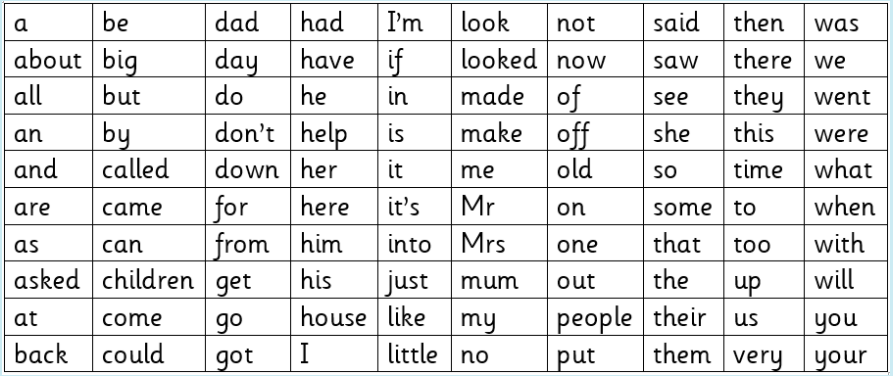
Year 2 Common Exception Words

THANK YOU FOR SUPPORTING YOUR CHILD'S LEARNING
:)
